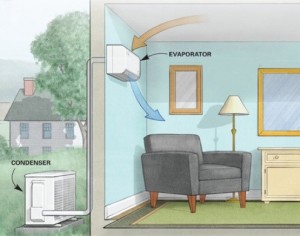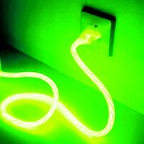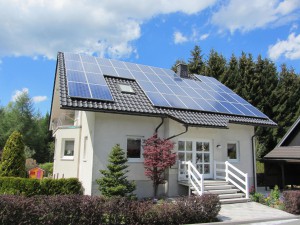Heat pumps are awesome – everyone says that right? But they’re also kind of… magical? Not really, of course. But the technology that drives heat pumps is mysterious unless you’re an expert in physics AND heating and cooling. And most literature on the Internet either wants you to buy a heat pump, or wants you to NOT buy a heat pump and stick to oil or propane for heat. So we decided to demystify heat pumps for everyone and answer questions straight up so you can make your own informed buying decisions. Are you ready to learn? Here we go:
What is a heat pump?
A heat pump is a standalone, two-component appliance that uses refrigeration technology and electricity to provide heating and cooling for homes, businesses and other applications. A heat pump has two components – a condenser unit that most often sits outside of a home that produces the heating or cooling, and an indoor unit that typically sits on a wall and passes hot or cool air into the home; because the condenser and air handler are separated or “split” by refrigerant line, heat pumps may sometimes be referred to as “mini-splits.” Heat pumps offer extraordinarily high efficiency rates, as well as the opportunity to provide heating and cooling without needing duct work in the home; because duct work is not required, you may hear heat pumps referred to as “ductless.”
Here is an example of a common type of heat pump:
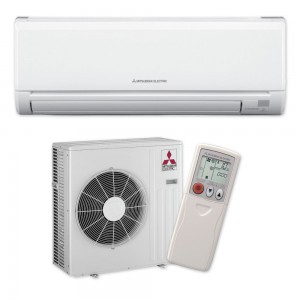
A Mitsubishi Heat Pump wall cassette (indoor unit) above and a condenser (outdoor unit) and remote control below. Please note that these images are not in proportion and condensers are typically two or more feet across.
How does a heat pump work?
In the simplest terms, a heat pump uses electricity and refrigerant to move heat from one location to another.
To provide heat, a heat pump works by extracting heat from the air outside of your home and transferring it to refrigeration coolant – the coolant is then compressed, which increases the temperature significantly; the coolant is then moved to the indoor unit of the heat pump, which then passes air over the hot coolant, increasing its temperature to accommodate the thermostatic call for heat inside the home.
A heat pump consists of two major parts – a “wall cassette” that is mounted inside your home, and a condenser unit that stays on the outside of your home. The heat pump’s wall cassette and condenser units are connected by refrigerant line.
The indoor wall cassette is thermostatically controlled to provide you with both heating and cooling. When there is a call for heat, the heat pump will turn on the fan in the outdoor unit to begin the process of extracting heat from the air outside of your home. The refrigerant line carries this heat to the indoor unit, which then transfers the heat to the air inside of your home via a fan inside the wall cassette. In cooling mode the process is reversed, transferring heat out of your home and returning cool air to the inside.
What is the benefit of having a heat pump?
Because a heat pump only uses electricity for power rather than for the generation of heat, it offers a remarkably high efficiency rate. When using traditional resistive electric heat – such as electric baseboard or space heaters, for instance – the amount of heat generated is proportional to the amount of electricity used: one unit of heat per unit of electricity for 100% efficiency.
With a heat pump, the efficiency rate goes up dramatically because the electricity consumed is only used to power the two fans (evaporator and condenser), compressor, and pump to concentrate heat outside and bring it into your home. Because of this, heat pumps are capable of providing more than 3 units of heat for every unit of electricity used for efficiency rates over 300%. With Maine’s average winter temperatures of 37 degrees, the seasonal efficiency rate of the Mitsubishi Hyper Heat is right around 285%
This means lower electricity bills for a comfortable home – heat pumps are very inexpensive to run, increasing your electric bill by an average of $75 monthly per heat pump that is constantly running in the home. If you are using a heat pump along with a primary heating system such as oil, gas or electric, you’ll find extra savings by using the heat pump to offset the primary fuel use: one heat pump can offset up to 300 gallons of oil in a typical home, saving money on expensive fossil fuels. Plus, heat pumps will help in this way to reduce your home’s carbon footprint.
How does a heat pump affect my heating and electricity bills?
Each single unit (often referred to as a one-to-one) heat pump that is used daily will increase your electricity bill by $50 to $100 per month. However, the heat pump will reduce your heating fuel bill accordingly – for a typical household that uses 800 gallons of oil per year, a heat pump can reduce the amount of oil used by 300 gallons. If oil costs $2.75 per gallon, the price per million BTU (British Thermal Units, the standard measure of heat in the US) would be $28.06. To get the same amount of heat, 1 million BTU, from a heat pump with the current standard electric rate of 14.5 cents per kilowatt hour, it would cost you $14.71. In other words, heating your home with a heat pump is equivalent heating your home with oil for $1.44 per gallon, or for 48% less.
What are the benefits of a heat pump when used with solar electricity?
The benefit of solar panels is that during the day when the sun is shining, your rooftop panels are harvesting solar energy and converting that energy to be used in your home as electricity. In many homes, power generated by the array that is not used in the home is credited back to you by your electric utility company and is used to offset your electric bill at the end of each month. Most homes will still have an electricity bill for power used overnight, during storms, or during periods of high use such as very hot periods of summer.
However, your heat pump is powered by electricity – and when you pair solar panels for electricity with heat pumps for heat (which use electricity for power), you are heating your home for an average of about 9 cents per kWh vs. 14.5 cents per kWh without solar, effectively reducing your cost to run your heat pump by almost 40% annually.
Is it true that heat pumps stop working when it gets very cold out?
Yes – but it would have to get very, very cold for a heat pump to stop working entirely.
Different models of heat pumps have different ratings for how cold it can be before they stop being effective. For the sake of this example, we will use the rating for a Mitsubishi Hyper Heat™ heat pump, which is rated to provide sufficient heat output down to -13 degrees Fahrenheit.
Heat pumps are rated for “output.” In this example, when it is 30 degrees out, a heat pump will easily produce 100% of its output at the highest efficiency. However, as temperatures start dropping, output starts dropping as well – and when output starts dropping, the heat pump will “work harder” to keep your home at temperature. Much like having to put your foot on the gas to get your car up a steep hill, this is where efficiency rates of heat pumps start to drop – more energy is used to produce less output.
With the Mitsubishi Hyper Heat™ heat pump, the efficiency rate will start to drop at around 2 degrees Fahrenheit. At -2 degrees, you will get around 87% of the unit’s output. And at -13 degrees, you will get around 76% of the unit’s output. It is unclear at what temperature the unit will stop working entirely – we haven’t yet had a day cold enough to demonstrate that with the Hyper Heat™ heat pumps, though some Mitsubishi documentation suggests a stopping point of -18 degrees.
In older houses with less insulation, large amounts of heat loss, or drafts, a heat pump will also need to work harder to accommodate the rapid loss of heat due to these issues. However, newer homes often have outstanding insulation and are built to prevent heat loss – in these cases, the heat created by a heat pump is kept inside the home and helps the heat pump perform with greater efficiency.
Can I heat my home with heat pumps without any other heat source?
 In certain warmer climates, heat pumps can be the sole source of winter heat. However, here in Maine, we recommend that most homes have either a primary or backup source of heat for very cold days or long periods of low temperatures during which heat pumps would have trouble recovering from heat loss. These other sources can be oil, gas, propane, electric or biomass, through True North suggests biomass wood pellet heat or natural gas heat for lower heating fuel costs and lower carbon emissions that contribute to climate change.
In certain warmer climates, heat pumps can be the sole source of winter heat. However, here in Maine, we recommend that most homes have either a primary or backup source of heat for very cold days or long periods of low temperatures during which heat pumps would have trouble recovering from heat loss. These other sources can be oil, gas, propane, electric or biomass, through True North suggests biomass wood pellet heat or natural gas heat for lower heating fuel costs and lower carbon emissions that contribute to climate change.
What is a heat pump water heater?
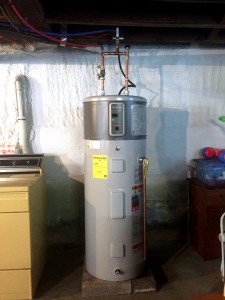
This Geospring Pro Hybrid Electric Heat Pump Water Heater was installed in a Maine basement for maximum efficiency
A heat pump water heater uses the same heat pump technology described above to heat a home’s domestic hot water. Heat pump water heaters are very well-insulated, and water can hold heat very well – as such, heat pump water heaters can provide hot water for a typical family of four at a very low operating cost, most often $15 or less per month.

